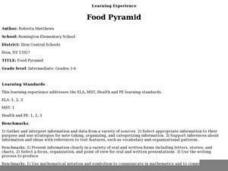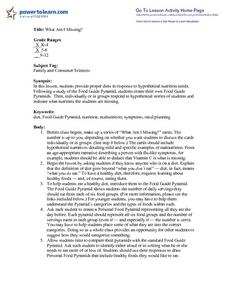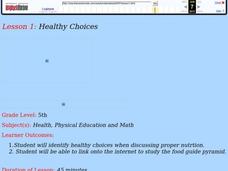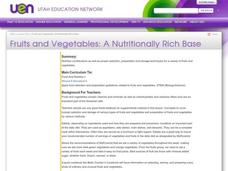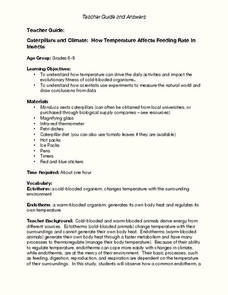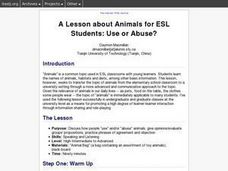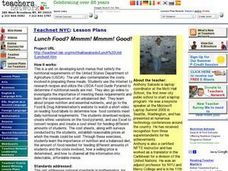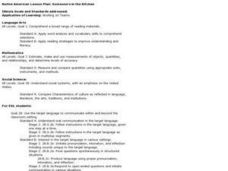Curated OER
Food Pyramid - Daily Diet Diary
Pupils keep a daily diet diary and discuss the Food Pyramid. They investigate other geometric shapes as a way to display daily food guidelines. In groups, they design a menu for the Food Pyramid Restaurant.
Curated OER
What's the Shape of Your Diet?
Fifth graders explore the food pyramid. In this food pyramid activity, 5th graders investigate a proper balanced diet and compare their daily diet with recommendations from the food pyramid. Students create a visual representation of...
Curated OER
What Am I Missing?
Discuss nutrition and identify components of a healthy diet, view a Food Guide Pyramid, and create a Personal Food Pyramid, listing all foods eaten in the past 24 hours. Compare food lists with the standard Food Guide and determine where...
Curated OER
Our Choices Matter: What You Eat
Students will record their food choices for one week, noting calories, protein and vitamin content of foods using a given USDA website. Students will discuss whole class the important of proper nutrition and its role, and what happens...
Curated OER
Understanding MyPyramid
Fifth graders investigate serving sizes. In this serving size lesson plan, 5th graders study the food pyramid paying special attention to proper serving sizes of food. Resources are provided.
Curated OER
Healthy Choices
Fifth graders discover how to make healthy choices in nutrition. For this nutrition lesson, 5th graders research the daily nutrition requirements recommended by the U.S. Department of Agriculture. Students keep a food diary for three...
Curated OER
Energy Balance: The Ins and Outs
Students review data from a 24-hour dietary recall to gain an understanding of the information regarding energy intake and macronutrients.
Curated OER
Changing unhealthy eating habits
Students identify the elements of a balanced diet, then compile a daily diet and exercise log to assess their lifestyles and improve them if applicable. They recognize and explain the importance of proper nutrition practices.
Curated OER
Fruits and Vegetables: A Nutritionally Rich Base
Learners examine proper selection, preparation and storage techniques for a variety of fruits and vegetables. In groups, they prepare various types of salads.
Curated OER
Life Skills for Vocational Success: Health: Lesson 2: Nutrition
Students record all food intake for a week. They discuss each of the six different food groups, particularly which foods are included in each group. Students discuss calorie intake. They discuss a well-balanced diet, and its importance...
Curated OER
Making Healthy Food Choices
In this well-designed nutritional activity, students are given the opportunity to create their own daily food record, compare their nutrient with minimimun requirements, and think critically about their own food choices. Materials and...
Curated OER
Someone Is In The Kitchen
Pupils investigate the lifestyles of the Native Americans and look at a recipe found on a website. They read the recipe and pay attention to the measurements. They differentiate between the various measures in order to apply them to the...
Curated OER
Caterpillars and Climate: How Temperature Affects Feeding Rate In Insects
Do you eat more when you are hot or when you are cold? Young scientists observe the eating pace of two caterpillars at different temperatures. The differences in endotherm and ecotherm animals' ability to adjust to temperature change...
Curated OER
Feeding Your Fish
Students discuss nutrition and diet. They look at copies of Tetra's Daily Nutrition Pyramid for Tropical Fish. They compare the fish feeding pyramid to the pyramid for human nutrition. Students examine a can of fish food.
Curated OER
Creating Fitness Goals
Young scholars create a fitness goal to include one of the following: muscle building, cardiovascular development or healthful diet. They utilize a daily calendar to record progress. They utilize the Internet to research proper ways to...
Curated OER
Nutrients
Fourth graders discuss whether they ate breakfast and if so, did their breakfast contain all that their body needs until lunch time. They talk about the definition of nutrients and that every part of their body needs water. They also...
Curated OER
A Lesson about Animals for ESL Students: Use or Abuse?
Students discuss animal care using proper phrases of agreement and objection. They role play and make presentations on their animal studies.
Curated OER
My Pyramid
Tenth graders analyze the new Food Guide Pyramid. In this healthy diet lesson, 10th graders explore the the website with the new food pyramid. Students use magazines to find foods from the food groups and create their own pyramid....
Curated OER
Hunger and Malnutrition
Fifth graders investigate hunger and malnutrition. In this hunger and malnutrition instructional activity, 5th graders study the importance of proper nutrition. Students explore the scope of hunger and malnutrition problems.
Curated OER
Lunch Food? Mmmm! Mmmm! Good!
Examine how nutrition plays an important role in our lives by conducting online research and developing lunch menus that satisfy nutritional requirements set up by the United States Department of Agriculture. Students download recipes,...
Curated OER
Native American Lesson Plan: Someone's in the Kitchen
Young scholars use vocabulary necessary to complete cooking activities and tell others about the food. They discuss similarities and differences between Native American and other nationalities' foods made in their families.


